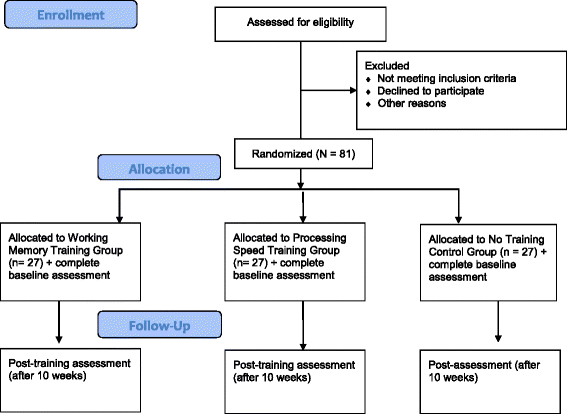Working memory and processing speed training in schizophrenia: study protocol for a randomized controlled trial
- PMID: 26812902
- PMCID: PMC4728776
- DOI: 10.1186/s13063-016-1188-5
Working memory and processing speed training in schizophrenia: study protocol for a randomized controlled trial
Abstract
Background: In most domains of cognition, individuals with schizophrenia are generally found to be one standard deviation below the mean of the controls. As a result, examining the impact of cognitive remediation in individuals with schizophrenia has been a burgeoning area of research. However, the state of the literature remains unclear as to which domains of cognition should be targeted to produce the most widespread and durable benefits for individuals with schizophrenia. One suggestion is that targeting lower-level cognitive processes that are important for higher-level and more complex aspects of cognition may produce the most widespread benefits in cognition and everyday functioning. Relatively few studies have examined the effects of working memory or processing speed training in schizophrenia, as most studies examine broad-based remediation programs. Thus, a need exists for targeted working memory and processing speed training studies to better understand the mechanisms of cognitive enhancement in patients. This study aims to 1) investigate near-transfer gains (that is, the transfer of learning to related contexts) associated with working memory and processing speed training in schizophrenia patients; 2) investigate far-transfer gains (that is, the transfer of learning to new contexts) associated with working memory and processing speed training (that is, gains in other neurocognitive domains and social cognition); and 3) investigate real-world gains associated with training (that is, gains in daily functioning).
Methods/design: A double-blind randomized controlled trial with a three parallel group design will be conducted. A random sample of 81 patients with schizophrenia or schizoaffective disorder will be recruited through outpatient clinics at Foothills Hospital and community support programs in Calgary, Alberta. Participants will be randomly assigned using a computer-generated program in a 1:1:1 ratio to a working memory-training group, a processing speed-training group, or a no-training control group. Training will be completed at home for 30 minutes per day, 5 days per week, for a total of 10 weeks. Neurocognitive, social cognitive, and daily functioning measures will be administered both pre- and post-training to detect training-related gains. The primary outcome measures will include working memory and processing speed (near-transfer measures), as well as fluid intelligence (far-transfer measure).
Trial registration: Current controlled trials NCT02478827 (ClinicalTrials.gov, registered on 15 June 2015).
Figures
Similar articles
-
A randomized controlled trial of working memory and processing speed training in schizophrenia.Psychol Med. 2019 Sep;49(12):2009-2019. doi: 10.1017/S0033291718002775. Epub 2018 Oct 3. Psychol Med. 2019. PMID: 30278853 Clinical Trial.
-
Cognitive and psychomotor effects of risperidone in schizophrenia and schizoaffective disorder.Clin Ther. 2008 Sep;30(9):1565-89. doi: 10.1016/j.clinthera.2008.09.014. Clin Ther. 2008. PMID: 18840365 Review.
-
Mechanisms of processing speed training and transfer effects across the adult lifespan: protocol of a multi-site cognitive training study.BMC Psychol. 2022 Jul 8;10(1):168. doi: 10.1186/s40359-022-00877-7. BMC Psychol. 2022. PMID: 35804410 Free PMC article.
-
Virtual reality as a method of cognitive training of processing speed, working memory, and sustained attention in persons with acquired brain injury: a protocol for a randomized controlled trial.Trials. 2024 May 22;25(1):340. doi: 10.1186/s13063-024-08178-7. Trials. 2024. PMID: 38778411 Free PMC article.
-
Immediate and long-term efficacy of executive functions cognitive training in older adults: A systematic review and meta-analysis.Psychol Bull. 2019 Jul;145(7):698-733. doi: 10.1037/bul0000196. Epub 2019 Apr 18. Psychol Bull. 2019. PMID: 30998045
Cited by
-
Impact of cannabinoids on synapse markers in an SH-SY5Y cell culture model.Schizophrenia (Heidelb). 2024 Oct 25;10(1):96. doi: 10.1038/s41537-024-00498-6. Schizophrenia (Heidelb). 2024. PMID: 39448630 Free PMC article.
-
The Effects of Four Compounds That Act on the Dopaminergic and Serotonergic Systems on Working Memory in Animal Studies; A Literature Review.Brain Sci. 2023 Mar 25;13(4):546. doi: 10.3390/brainsci13040546. Brain Sci. 2023. PMID: 37190512 Free PMC article. Review.
-
Generalized neurocognitive impairment in individuals at ultra-high risk for psychosis: The possible key role of slowed processing speed.Brain Behav. 2021 Mar;11(3):e01962. doi: 10.1002/brb3.1962. Epub 2021 Jan 23. Brain Behav. 2021. PMID: 33486897 Free PMC article.
-
Methylation pattern and mRNA expression of synapse-relevant genes in the MAM model of schizophrenia in the time-course of adolescence.Schizophrenia (Heidelb). 2022 Dec 8;8(1):110. doi: 10.1038/s41537-022-00319-8. Schizophrenia (Heidelb). 2022. PMID: 36481661 Free PMC article.
-
Association study of a genetic variant in the long intergenic noncoding RNA (linc01080) with schizophrenia in Han Chinese.BMC Psychiatry. 2021 Dec 8;21(1):613. doi: 10.1186/s12888-021-03623-2. BMC Psychiatry. 2021. PMID: 34879837 Free PMC article.
References
-
- American Psychiatric Association . Diagnostic and statistical manual of mental disorders. 5. Washington, DC: APA; 2013.
Publication types
MeSH terms
Associated data
Grants and funding
LinkOut - more resources
Full Text Sources
Other Literature Sources
Medical
Research Materials


